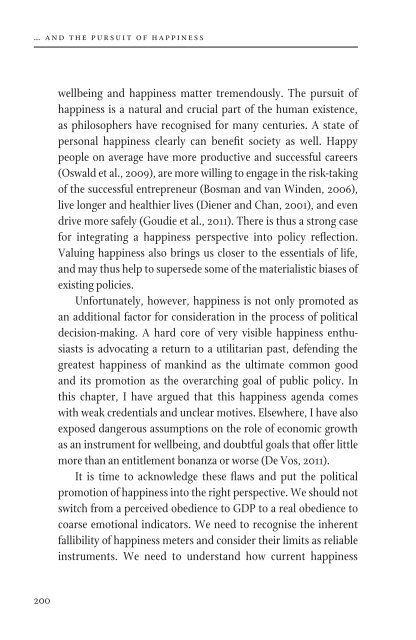… and the Pursuit of Happiness - Institute of Economic Affairs
… and the Pursuit of Happiness - Institute of Economic Affairs
… and the Pursuit of Happiness - Institute of Economic Affairs
Create successful ePaper yourself
Turn your PDF publications into a flip-book with our unique Google optimized e-Paper software.
<strong>…</strong> <strong>and</strong> <strong>the</strong> pursuit <strong>of</strong> happiness<br />
<strong>the</strong> unbearable lightness <strong>of</strong> happiness policy<br />
wellbeing <strong>and</strong> happiness matter tremendously. The pursuit <strong>of</strong><br />
happiness is a natural <strong>and</strong> crucial part <strong>of</strong> <strong>the</strong> human existence,<br />
as philosophers have recognised for many centuries. A state <strong>of</strong><br />
personal happiness clearly can benefit society as well. Happy<br />
people on average have more productive <strong>and</strong> successful careers<br />
(Oswald et al., 2009), are more willing to engage in <strong>the</strong> risk-taking<br />
<strong>of</strong> <strong>the</strong> successful entrepreneur (Bosman <strong>and</strong> van Winden, 2006),<br />
live longer <strong>and</strong> healthier lives (Diener <strong>and</strong> Chan, 2001), <strong>and</strong> even<br />
drive more safely (Goudie et al., 2011). There is thus a strong case<br />
for integrating a happiness perspective into policy reflection.<br />
Valuing happiness also brings us closer to <strong>the</strong> essentials <strong>of</strong> life,<br />
<strong>and</strong> may thus help to supersede some <strong>of</strong> <strong>the</strong> materialistic biases <strong>of</strong><br />
existing policies.<br />
Unfortunately, however, happiness is not only promoted as<br />
an additional factor for consideration in <strong>the</strong> process <strong>of</strong> political<br />
decision-making. A hard core <strong>of</strong> very visible happiness enthusiasts<br />
is advocating a return to a utilitarian past, defending <strong>the</strong><br />
greatest happiness <strong>of</strong> mankind as <strong>the</strong> ultimate common good<br />
<strong>and</strong> its promotion as <strong>the</strong> overarching goal <strong>of</strong> public policy. In<br />
this chapter, I have argued that this happiness agenda comes<br />
with weak credentials <strong>and</strong> unclear motives. Elsewhere, I have also<br />
exposed dangerous assumptions on <strong>the</strong> role <strong>of</strong> economic growth<br />
as an instrument for wellbeing, <strong>and</strong> doubtful goals that <strong>of</strong>fer little<br />
more than an entitlement bonanza or worse (De Vos, 2011).<br />
It is time to acknowledge <strong>the</strong>se flaws <strong>and</strong> put <strong>the</strong> political<br />
promotion <strong>of</strong> happiness into <strong>the</strong> right perspective. We should not<br />
switch from a perceived obedience to GDP to a real obedience to<br />
coarse emotional indicators. We need to recognise <strong>the</strong> inherent<br />
fallibility <strong>of</strong> happiness meters <strong>and</strong> consider <strong>the</strong>ir limits as reliable<br />
instruments. We need to underst<strong>and</strong> how current happiness<br />
surveys are biased towards fleeting emotions <strong>of</strong> hedonic pleasure<br />
that, if <strong>the</strong>y are to form <strong>the</strong> lightning rod for policy, will set<br />
humanity on a track <strong>of</strong> amoral gratification <strong>and</strong> overall decline.<br />
We need to square <strong>the</strong> reign <strong>of</strong> happiness with that <strong>of</strong> justice. We<br />
should be concerned not only with living <strong>the</strong> good life, but also a<br />
life that is good. We need to acknowledge that happiness meters<br />
fail to register how many <strong>of</strong> us seek wealth to achieve o<strong>the</strong>r goals –<br />
for ourselves, our families or our communities. We need to realise<br />
that happiness meters ignore <strong>the</strong> underlying factors that determine<br />
subjective wellbeing, among <strong>the</strong>m <strong>the</strong> powerful forces <strong>of</strong><br />
economic freedom <strong>and</strong> self-determination.<br />
Making <strong>the</strong> promotion <strong>of</strong> happiness <strong>the</strong> pinnacle <strong>of</strong> policy<br />
priorities is as easy in principle as it is hard in practice. It is easy to<br />
accept as a broad policy platitude. It is hard to reliably <strong>and</strong> verifiably<br />
go from platitude to action. The problem <strong>of</strong> <strong>the</strong> happiness<br />
agenda lies not so much in its aim as in <strong>the</strong> inherent fallibility <strong>and</strong><br />
arbitrariness <strong>of</strong> its implementation. There is only so much one<br />
can know about subjective wellbeing <strong>and</strong> only so much one can<br />
do about it through policy. At <strong>the</strong> point <strong>of</strong> action, <strong>the</strong> politics <strong>of</strong><br />
happiness will be more about <strong>the</strong> preferences <strong>of</strong> its authors than<br />
<strong>of</strong> its subjects.<br />
References<br />
Alesina, A., R. Di Tella <strong>and</strong> R. MacCulloch (2004), ‘Inequality<br />
<strong>and</strong> happiness: are Europeans <strong>and</strong> Americans different?’,<br />
Journal <strong>of</strong> Public <strong>Economic</strong>s, 88: 2009–42.<br />
Bell, D. (1996), The Cultural Contradictions <strong>of</strong> Capitalism, 20th<br />
anniversary edn, New York: Basic Books.<br />
200 201












